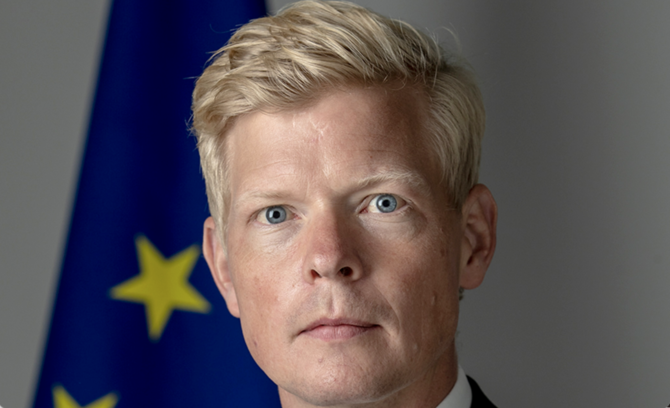ALEXANDRIA: Acclaimed as an experienced diplomat who has handled conflicts in the Middle East for two decades, the UN special envoy for Yemen Hans Grundberg has received support from regional and international countries along with Yemeni factions to end the war in Yemen.
On Friday, UN Secretary-General Antonio Guterres named the Swedish diplomat Grundberg as his special envoy for Yemen, succeeding Martin Griffiths, a Briton.
The UN chief said the new envoy would draw on more than 20 years of experience in international affairs to help resolve the war in Yemen. He cited his role in helping Yemenis broker the Stockholm Agreement that defused fighting in the western province of Hodeidah in late 2018.
Shortly after the announcement, the Yemeni government, Saudi Arabia, the US and other countries congratulated the new envoy and expressed support for his mission to end the war in Yemen.
Saudi Foreign Minister Prince Faisal bin Farhan said the Kingdom would stand by the new UN envoy and backed all peace efforts to end the war.
“We wish him success in his new role and look forward to working with him. The Kingdom will continue to support all efforts to reach a political solution that helps bring peace and prosperity to Yemen,” Prince Faisal said on Twitter.
The internationally recognized government of Yemen also expressed support for the new UN envoy and repeated demands for resuming the peace process and reaching a political settlement that would end the Houthi takeover of power.
“The Yemeni government will continue to extend its hand to a just and sustainable peace based on the three references agreed upon nationally, regionally and internationally,” Yemen’s Foreign Ministry said in a statement carried by the official news agency SABA. It praised the new envoy as a “knowledgeable diplomat about the Yemeni crisis.”
US Secretary of State Antony Blinken said there was great international support for addressing the humanitarian crisis and ending the Yemen conflict.
“There is unprecedented consensus on resolving the conflict and a real opportunity for peace. Only a durable agreement among Yemenis can reverse the dire humanitarian crisis,” Blinken said in a statement.
Swedish Foreign Minister Ann Linde said the new envoy was an “excellent” diplomat and her country backed UN diplomatic efforts to end the suffering of the Yemeni people.
“Sweden looks forward to continuing our close collaboration with the UN in support of a durable cease-fire and a political solution to the conflict in Yemen,” she tweeted.
Peace efforts to reach a peaceful settlement in Yemen, sponsored by the Griffiths, failed as Iran-backed Houthis refused to put into place a nationwide truce and stop their deadly offensive on the central city of Marib.
The Omani foreign ministry, whose mediators visited Sanaa in June and failed to convince the Houthis to accept the UN peace initiative, hoped that the new envoy’s expertise on Yemen would help to push for peace, stating that the sultanate would back his mission to solve the Yemeni crisis “as soon as possible.”
Since the start of the Houthi offensive in February, the former UN envoy pushed for a truce for all battlefields in exchange for opening Sanaa airport and easing restrictions on ports under Houthi control, followed by peace talks between warring factions in Yemen.
The rebels demanded that the Arab coalition first stop its air support to the Yemeni government to accept the proposal.
On Saturday, Hussein Al-Azzi, a Houthi official, welcomed the appointment of the UN envoy and urged him to solve the humanitarian crisis and to create “a supportive atmosphere for constructive and fruitful talks.”
During the past seven years, Houthis have boycotted two UN envoys to Yemen and accused them of being biased.
Other Yemeni key factions such as the separatist Southern Transitional Council (STC) and the National Resistance have also promised to comply with UN peace efforts to end the war.
Yemen experts and political analysts argue that the Houthi reluctance to end their military operations across Yemen might impede the UN envoy’s efforts to end the war.
“The biggest challenge facing the new envoy is convincing the Houthis to accept a cease-fire. All other parties, including the legitimate government, have accepted the peace initiative,” Najeeb Ghallab, undersecretary at Yemen’s Information Ministry and a political analyst, told Arab News.
Another challenge is dealing with powerful forces that have emerged during the war, such as the STC, which calls for partitioning Yemen into two states.


























